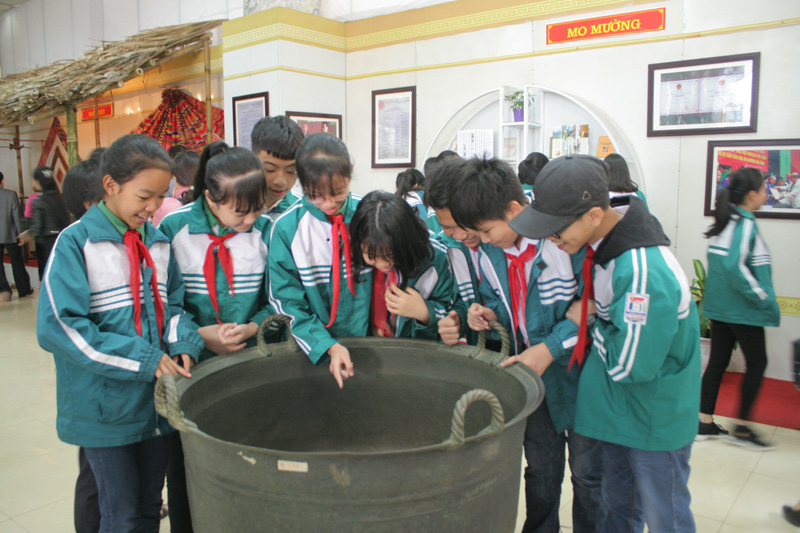
(HBO) – In the cultural heritage of Vietnamese people, the culture of Muong ethnic group is imprinted in various fields.
Students
come to study exhibits at the provincial museum under the theme "Typical
cultural heritage of Muong ethnic group in Hoa Binh province”.
On display are nearly 200 documents and objects reflecting some unique features
of Muong culture in Hoa Binh province. The most outstanding is the display area
of Muong ethnic group’s traditional brocade weaving. This craft has existed for
a long time. Girls from 9 to 10 years old know to follow their mothers to the
fields to grow and harvest cotton. When they are 13-14 years old, they learn to
practise spinning.
For the first time, Mo Muong cultural heritage has been shown to the public. Mo
Muong is a collection of mythological epics performed at the funeral of Muong
ethnic people. It reflects the spiritual life and the development history of
Muong ethnic group as well as their viewpoints on life and death, the eternal
existence of human souls, and desires for community cohesion, peace, and good
future.
Today, Mo Muong still exists and is constantly improved by many generations of
Mo prayers. The special value of Mo Muong has been included in the list of
national intangible cultural heritages by the Ministry of Culture, Sports and
Tourism.
Bui Thi Niem, Director of the provincial Department of Culture, Sports and
Tourism, said the cultural heritage of Muong ethnic people in Hoa Binh is
demonstrated in the architecture of stilt houses, costumes, gastronomy,
cultural and historical relic sites, and antiques such as bronze drums, gongs,
and pottery in Muong people’s graves as well as other fields like traditional
customs, festivals, rituals, music, and performing art.
Muong ethnic people in Hoa Binh are always proud to be the cradle of the "Hoa
Binh Culture” dating back to more than 20,000 years with the preservation of
hundreds of bronze drums and more than 5,000 precious gongs as well as numerous
festivals featuring the unique culture of the ancient Vietnamese./.
With an increasingly vibrant and widespread emulation movement aimed at building cultured residential areas and cultured families, Yen Thuy District has been making steady progress toward improving both the material and spiritual well-being of its people, while fostering a civilized, prosperous, beautiful, and progressive community.
Once lacking recreational spaces and community facilities, Residential Group 2 in Quynh Lam Ward (Hoa Binh City) has recently received attention for the construction of a new, spacious, and fully equipped cultural house. The project followed the model of state support combined with public contributions in both labor and funding.
The "All people unite to build cultural life" movement, which has been effectively integrated with Kim Boi district’s socio-economic development goals, is fostering a lively spirit of emulation across local residential areas, hamlets, villages, public agencies, and enterprises. In addition, through the initiative, traditional cultural values are being preserved and promoted, while community solidarity and mutual support in poverty reduction and economic development are being strengthened.
A working delegation of the Hoa Binh provincial People’s Committee led by its Permanent Vice Chairman Nguyen Van Toan on June 11 inspected the progress of a project to build the Mo Muong Cultural Heritage Conservation Space linked to tourism services in Hop Phong commune, Cao Phong district.
Born and growing in the heroic land of Muong Dong, Dinh Thi Kieu Dung, a resident in Bo town of Kim Boi district, in her childhood was nurtured by the sweet lullabies of her grandmother and mother. These melodies deeply imprinted on her soul, becoming an inseparable part of her love for her ethnic group's culture. For over 20 years, this love for her hometown has driven Dung to research, collect, and pass down the cultural values of the Muong people to future generations.
In the final days of May, the Ethnic Art Troupe of Hoa Binh Province organized performances to serve the people in remote, mountainous, and particularly disadvantaged areas within the province. These were not just ordinary artistic shows, but they were the meaningful journeys aimed at spreading cultural values, enhancing the spiritual life of the people and contributing to the preservation of ethnic minority cultural identities.



